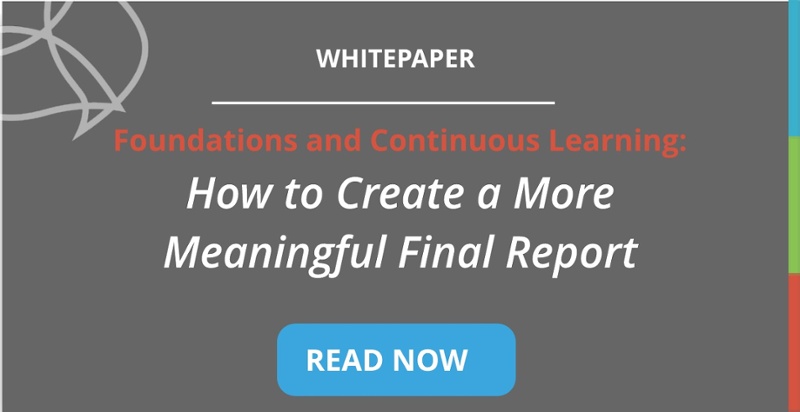 This post was originally published on the PEAK Grantmaking blog in November, 2017.
This post was originally published on the PEAK Grantmaking blog in November, 2017.
It’s inevitable: at the end of every grant cycle, a final report provides a record of grantee successes, challenges, and monies spent. But how often does the final report become a meaningful mechanism for further reflection or change?
Too often the final report is simply a mirror image of the original grant proposal, making it difficult for grantees and foundations alike to benefit from observations gleaned during funding cycle itself. And when actionable data gets lost in long-form narrative or siloed into an endless assessment process, both foundations and grantees lose out on valuable opportunities to grow and learn.
It’s time to rethink the final report. By embracing real-time, grantee-focused reporting, foundations will be better positioned to track short- and long-term objectives, guide grantees toward success, and use reporting data to effect change in the sector.
Where the Final Report is Failing Us
While final reports fulfill their function as important components of grant compliance and administration, it’s important to recognize how much more effective reporting can be. Final reports simply aren’t an effective way to learn. The final reporting process provides grantees with little time or space to reflect on impact data, program successes and challenges, lessons learned, or strategies for the future.
What’s more, by their very nature, final reports aren’t responsive. Because reports are due at the end of a funding cycle, report narratives, outcomes data, and grantee reflections are, at best, used for the next calendar year or funding cycle. This lag time prevents foundations from identifying strategic adjustments for grantees to make in real time, or from offering expert guidance that could be helpful during an active funding cycle.
How to Create a More Meaningful Feedback Loop
In a benchmark survey from the Center for Effective Philanthropy, 82 percent of grantmakers revealed that creating evaluation materials that result in useful findings for their grantees is a challenge.
So what can be done?
Take back the final report by emphasizing meaningful real-time data collection with your grantees – and gain strategic insights that drive change at every level of funding. Here are four strategies grantmakers can use to rethink their existing reporting models, emphasize meaningful real-time data collection, and gain strategic insights:
- Get aligned from the start. From the proposal stage, take the time to develop reporting questions, including unique data points grantees should track throughout their funding cycle. By identifying outcomes and metrics that accurately reflect both the grantee’s program goals and the foundation’s funding strategy, foundations will ensure that grantees align strategically with a grant area or overarching foundation goal.
- Identify a reporting structure that fits a program’s unique needs. Each grant program requires a unique reporting structure, and foundations should provide grantees with the ability to break down a narrative report into component parts with corresponding data points. This strategy makes reporting adaptable across sectors, like arts education and policy, as well as grant type, from capacity building grants to program funding. Consider the short-term steps that indicate a grantee is on track to achieve long-term goals. What reporting structure for metrics and outcomes will add valuable data to a narrative account? Use grants management software to reduce the burden on grantees and take the guesswork out of reporting metrics, making the final report a transparent process from the very beginning.
- Encourage a productive feedback loop for continuous learning. Real-time reporting is an effective way for foundations to stay in touch with grantees throughout the funding cycle and learn valuable lessons from the nonprofits in their portfolios. When program staff are in regular touch with grantees, they have more opportunities to provide the strategic guidance that builds grantee capacity. Moreover, collecting data in real time has an impact on learning, strategy, and implementation – for foundation staff and grantees alike. Grants management software that provides a platform to share multimedia updates can also can be an effective companion to longform narratives, empowering grantees to tell a meaningful story about their objectives and outcomes as they unfold.
- Drive future collaborations – within the foundation and with grantee partners. Program staff, grants managers, and communications teams all have unique needs for programmatic data and outcomes. Not only does real-time access to data help speed up decision-making for each of these departments, but it can also lead to further collaboration and better strategy. For example, when foundation staff have the ability to run a report on trends across program areas or among a group of grantees, they are more empowered to identify gaps in funding opportunities.
Finally, a responsive final report increases opportunities for collaboration with grantees and creates space for them to develop a sense of ownership over reporting outcomes. This reciprocal relationship empowers grantees to become active partners in your field – and in their own funding cycle. What’s more, grantee data shines a light on the need for specific funding opportunities or interventions, which can directly impact a foundation’s theory of change.
The success of every foundation’s grant program depends on staff and grantee access to high quality program evaluation and assessment. Not only does assessment paint an accurate picture of a foundation’s long-term strategic outcomes, but it also helps foundations identify and fund goals that make a broader impact on their community.
Every nonprofit sets out to leave the most positive impact possible in their community, and every foundation seeks to fund those efforts for the same reasons. Current grantmaking processes may sometimes hinder these initiatives, but shifting to a grantee-centered, relationship-based, and technology-driven approach to reporting could eliminate unnecessary hurdles so organizations can focus on their missions, and making important changes in the world.